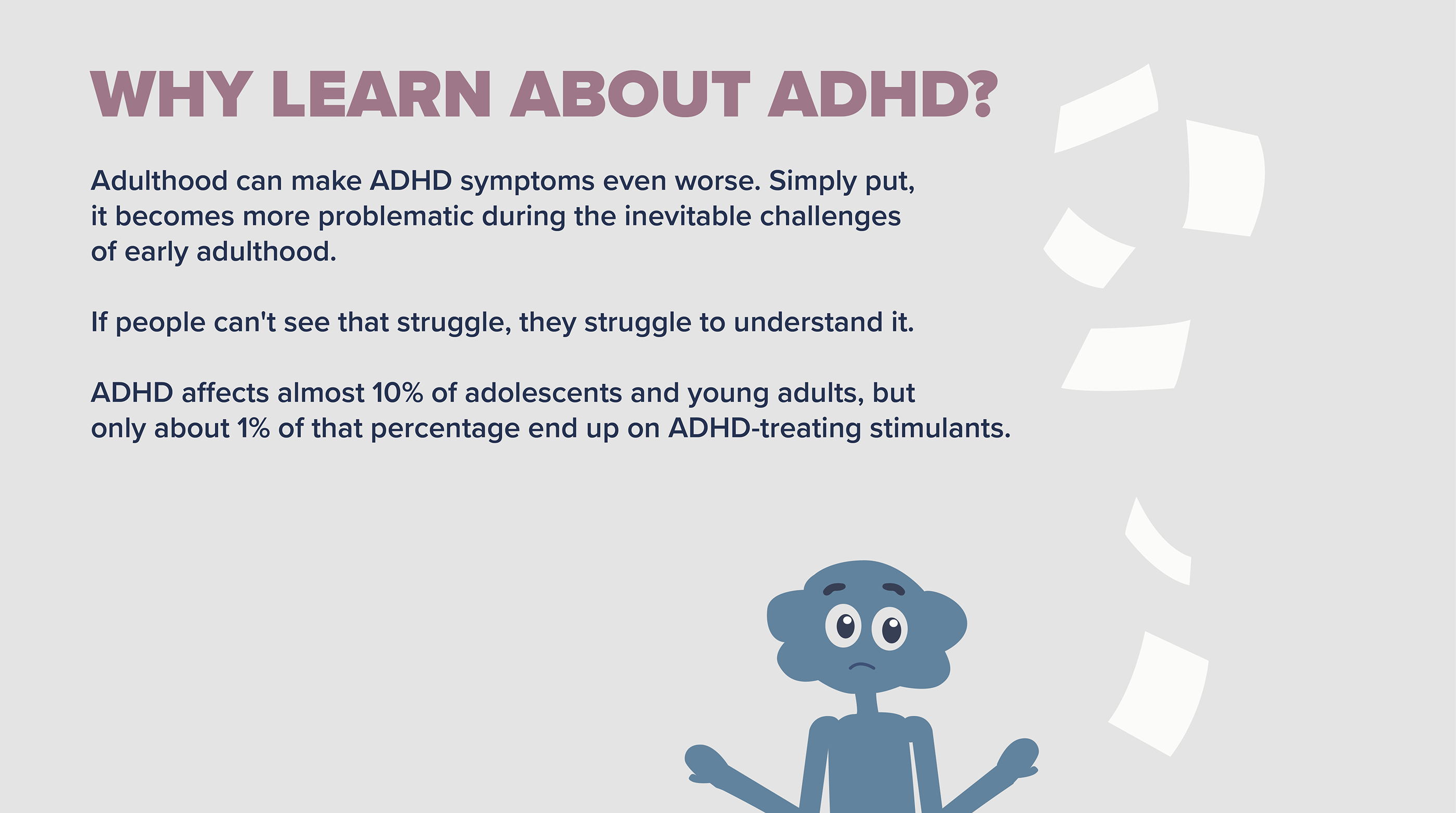You Think You Have Adult ADHD? Now What?

Table of Contents
Understanding Adult ADHD Symptoms and Self-Assessment
While ADHD is often diagnosed in childhood, its symptoms can persist and even evolve into adulthood. Adult ADHD often presents differently than in children; hyperactivity may manifest as restlessness or internal anxiety rather than outward physical activity. Understanding these differences is crucial for accurate self-assessment.
Common Adult ADHD Symptoms:
- Inattention: Difficulty focusing on tasks, easily distracted, forgetful, trouble organizing tasks and time. Example: Losing track of conversations mid-sentence, misplacing important items frequently, struggling to complete work projects due to constant distractions.
- Hyperactivity: Restlessness, fidgeting, difficulty sitting still, excessive talking, interrupting others. Example: Feeling an overwhelming need to be constantly moving, struggling to relax or unwind, having difficulty staying seated during meetings or social events.
- Impulsivity: Acting without thinking, difficulty controlling emotions, making rash decisions, interrupting others frequently. Example: Making impulsive purchases, saying things without considering the consequences, frequently changing jobs or relationships.
Important Disclaimer: This self-assessment is not a substitute for a professional diagnosis. While several online resources offer ADHD checklists and questionnaires, they provide preliminary insights only. A qualified healthcare professional's evaluation is essential for an accurate diagnosis.
Reliable online resources can help you better understand potential symptoms, but remember their limitations. Always seek professional guidance.
Seeking a Professional Diagnosis
Obtaining a formal diagnosis of adult ADHD is paramount for accessing appropriate treatment and support. This involves a comprehensive evaluation by a qualified healthcare professional, such as a psychiatrist, psychologist, or other licensed clinician specializing in ADHD.
The diagnostic process typically includes:
- A detailed medical history review: This includes assessing the presence of ADHD symptoms throughout your life, exploring potential contributing factors, and reviewing any relevant family history.
- A thorough symptom evaluation: You'll be asked detailed questions about your symptoms, their severity, and their impact on your daily life. This may involve standardized questionnaires or rating scales.
- Potential neuropsychological testing: In some cases, neuropsychological testing may be recommended to assess cognitive functions and rule out other conditions.
Finding a qualified professional might involve:
- Seeking referrals: Ask your primary care physician, therapist, or other healthcare providers for recommendations.
- Using online search engines: Search for "ADHD specialists near me" or "adult ADHD diagnosis [your city/region]".
- Connecting with support groups: Support groups for adults with ADHD can often provide valuable referrals and advice.
Treatment Options for Adult ADHD
Once diagnosed, several treatment options can help manage adult ADHD symptoms effectively. Treatment is often personalized, combining different approaches to achieve the best outcome.
Medication Management:
- Stimulant medications: These are commonly prescribed and can improve focus, attention, and impulse control. Potential side effects can include appetite suppression, sleep disturbances, and increased heart rate.
- Non-stimulant medications: These offer an alternative for individuals who cannot tolerate stimulants or experience adverse side effects. They may be less effective than stimulants for some individuals.
Therapy:
- Behavioral therapy: This helps individuals develop strategies to manage their symptoms and improve their daily functioning.
- Cognitive behavioral therapy (CBT): This therapy helps individuals identify and change negative thought patterns and behaviors that contribute to their challenges.
Lifestyle Adjustments:
- Regular exercise: Physical activity can improve focus, mood, and sleep quality.
- Mindfulness techniques: Practices like meditation can enhance self-awareness and emotional regulation.
- Improved sleep hygiene: Prioritizing consistent sleep patterns can significantly impact symptom management.
Coping Strategies and Support for Adults with ADHD
Living with adult ADHD requires developing effective coping strategies and building a supportive network.
Practical strategies:
- Organization tools: Utilize planners, calendars, to-do lists, and time management apps to stay organized and on track.
- Time management techniques: Employ time-blocking, the Pomodoro Technique, or other strategies to improve focus and productivity.
- Breaking down tasks: Divide large projects into smaller, more manageable steps to reduce feelings of overwhelm.
Building a support system:
- Self-compassion: Practice self-kindness and understanding; recognize that ADHD is a neurological condition, not a personal failing.
- Support groups: Connect with others facing similar challenges to share experiences and gain support.
- Online communities: Find online forums and communities dedicated to adult ADHD for information and peer support.
Taking the Next Steps with Your Adult ADHD
Understanding adult ADHD symptoms, seeking professional diagnosis, exploring treatment options, and building a supportive network are all crucial steps in effectively managing this condition. Remember, a professional diagnosis is essential for developing a personalized treatment plan that addresses your specific needs. Don't let undiagnosed adult ADHD hold you back. Take the first step towards a better understanding and management of your symptoms today! Schedule an appointment with a qualified healthcare professional if you suspect you have adult ADHD. For additional resources and support, explore organizations dedicated to ADHD research and advocacy. Living with adult ADHD doesn't have to define you; with the right support and strategies, you can thrive.

Featured Posts
-
 Jeff Goldblum Releases Star Studded Jazz Album With Cynthia Erivo And Ariana Grande
Apr 29, 2025
Jeff Goldblum Releases Star Studded Jazz Album With Cynthia Erivo And Ariana Grande
Apr 29, 2025 -
 Analysis Trumps Likely Action Regarding Roses Pardon
Apr 29, 2025
Analysis Trumps Likely Action Regarding Roses Pardon
Apr 29, 2025 -
 How To Buy Capital Summertime Ball 2025 Tickets Now
Apr 29, 2025
How To Buy Capital Summertime Ball 2025 Tickets Now
Apr 29, 2025 -
 Capital Summertime Ball 2025 Tickets Where To Buy And What To Expect
Apr 29, 2025
Capital Summertime Ball 2025 Tickets Where To Buy And What To Expect
Apr 29, 2025 -
 Blue Origin Postpones Launch Details On The Subsystem Problem
Apr 29, 2025
Blue Origin Postpones Launch Details On The Subsystem Problem
Apr 29, 2025
